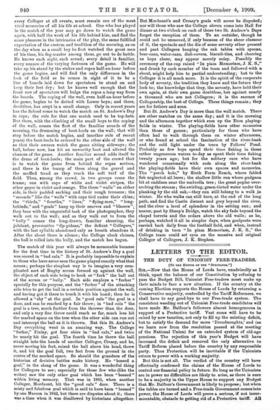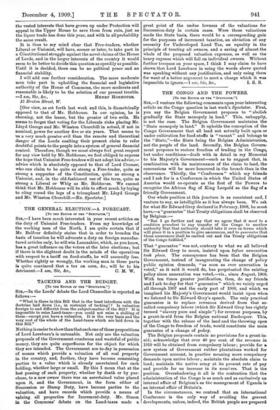LETTERS TO 1.111, EDITOR.
THE DUTY OF UNIONIST FREE-TRADERS. [TO THE EDITOR. 07 7011 "SPECTATOR.."] Sin, —Now that the House of Lords have, unadvisedly as I think, upset the balance of our Constitution by refusing to pass the Budget Bill, Unionist Free-traders must make up their minds to face a new situation. If the country at the coming Election supports the House of Lords by returning a Conservative majority, controlled by the Tariff Reformers, we shall have to say good-bye to our Free-trade system. The consistent weeding out of Unionist Free-trade candidates will have made Mr. Balfour's followers almost homogeneous in support of a Protective tariff. Vast sums will have to be raised by new taxation, not only to fill up the existing deficit, but to satisfy the demand for more 'Dreadnoughts,' and (as we learn now from the resolution passed at the meeting of the National Union) for an extended system of old-age pensions. The rejection of this year's Budget will have increased the deficit and removed the only alternative to Tariff Reform placed before the country by any responsible party. Thus Protection will be inevitable if the Unionists return to power with a working majority.
But this is not all. The verdict of the country will have effectually confirmed the claims of the House of Lords to control our financial policy in future. So long as the Unionists are in power no difficulties are likely to arise, as there is sure to be a majority in the Upper House to support any Budget that Mr. Balfour's Government is likely to propose; but when the tables are turned and a Free-trade Government comes into power, the House of Lords will prove a serious, if not insur- mountable, obstacle to getting rid of .a Protective tariff. All
the vested interests that have grown up under. Protection will appeal to the Upper House to save them from ruin, just as the liquor trade has done this year, and with in all probability the same result.
It is thus to my mind clear that Free-traders, whether Liberal or Unionist, will have, sooner or later, to take part in a COnstitutional struggle against the novel claims of the House of Lords, and in the larger interests of the country it would seem to be better to decide this question as speedily as possible. Until it is decided, there can be no political peace and no financial stability.
I will add one further consideration. The more moderate men take part in upholding the financial and legislative authority of the House of Commons, the more moderate and reasonable is likely to be the solution of our present trouble.
[Our view, as set forth last week and this, is diametrically opposed to that of Mr. Hobhouse. In our opinion, he is choosing, not the lesser, but the greater of two evils. He seems to forget that voting for the Liberals risks placing Mr. Lloyd George and Mr. Winston Churchill in actual, if not in nominal, power for another five or six years. That seems to us a very much greater evil than the remote and theoretical danger of the Lords exalting their present claim to refer doubtful points to the people into a system of general financial control. Therefore, though we must always feel great respect for any view held by Mr. Hobhouse, we feel obliged to express the hope that Unionist Free-traders will not adopt his advice,— advice which is absolutely opposed to that of Lord Cromer, who can claim to be quite as strong a Free-trader, quite as strong a supporter of the Constitution, quite as strong a Unionist, and, in the old-fashioned use of the term, quite as strong a Liberal or Whig as Mr. Hobhouse. We cannot think that Mr. Hobhouse will be able to effect much by trying to cling round the legs of a triumphant Mr. Lloyd George and Mr. Winston Churchill.—ED. Spectator.]







































































 Previous page
Previous page